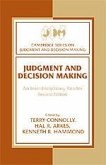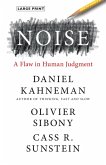Comparative Decision Making
Herausgeber: Zentall, Thomas R; Crowley, Philip H
Schade – dieser Artikel ist leider ausverkauft. Sobald wir wissen, ob und wann der Artikel wieder verfügbar ist, informieren wir Sie an dieser Stelle.
Comparative Decision Making
Herausgeber: Zentall, Thomas R; Crowley, Philip H
- Gebundenes Buch
- Merkliste
- Auf die Merkliste
- Bewerten Bewerten
- Teilen
- Produkt teilen
- Produkterinnerung
- Produkterinnerung
Decisions are made by individual humans-but also by corporations, plants, robots, and computer programs. The authors of this volume help initiate a powerful new comparative dimension for our analysis and application of decision making across an enormous range of intellectual enquiry.
Andere Kunden interessierten sich auch für
![Goal-Based Decision Making Goal-Based Decision Making]() Stephen SladeGoal-Based Decision Making181,99 €
Stephen SladeGoal-Based Decision Making181,99 €![Judgment and Decision Making Judgment and Decision Making]() Judgment and Decision Making182,99 €
Judgment and Decision Making182,99 €![Intuition in Judgment and Decision Making Intuition in Judgment and Decision Making]() Cornelia Betsch / Tilmann Betsch / Henning Plessner (eds.)Intuition in Judgment and Decision Making181,99 €
Cornelia Betsch / Tilmann Betsch / Henning Plessner (eds.)Intuition in Judgment and Decision Making181,99 €![Beliefs, Reasoning, and Decision Making Beliefs, Reasoning, and Decision Making]() Beliefs, Reasoning, and Decision Making176,99 €
Beliefs, Reasoning, and Decision Making176,99 €![Judgment and Decision Making Judgment and Decision Making]() Judgment and Decision Making169,99 €
Judgment and Decision Making169,99 €![Neuroeconomics, Judgment, and Decision Making Neuroeconomics, Judgment, and Decision Making]() Neuroeconomics, Judgment, and Decision Making195,99 €
Neuroeconomics, Judgment, and Decision Making195,99 €![Noise Noise]() Daniel KahnemanNoise30,30 €
Daniel KahnemanNoise30,30 €-
-
Decisions are made by individual humans-but also by corporations, plants, robots, and computer programs. The authors of this volume help initiate a powerful new comparative dimension for our analysis and application of decision making across an enormous range of intellectual enquiry.
Produktdetails
- Produktdetails
- Verlag: Hurst & Co.
- Seitenzahl: 512
- Erscheinungstermin: 27. Februar 2013
- Englisch
- Abmessung: 243mm x 163mm x 29mm
- Gewicht: 866g
- ISBN-13: 9780199856800
- ISBN-10: 019985680X
- Artikelnr.: 36597701
- Herstellerkennzeichnung
- Libri GmbH
- Europaallee 1
- 36244 Bad Hersfeld
- gpsr@libri.de
- Verlag: Hurst & Co.
- Seitenzahl: 512
- Erscheinungstermin: 27. Februar 2013
- Englisch
- Abmessung: 243mm x 163mm x 29mm
- Gewicht: 866g
- ISBN-13: 9780199856800
- ISBN-10: 019985680X
- Artikelnr.: 36597701
- Herstellerkennzeichnung
- Libri GmbH
- Europaallee 1
- 36244 Bad Hersfeld
- gpsr@libri.de
Thomas Zentall is a comparative cognitive psychologist who studies the similarities and differences between the behavior of humans and other animals; both the cognitive behavior of other animals and the noncognitive behavior of humans. For example, social learning, concept learning, memory strategies, suboptimal gambling behavior, and the effect of effort on the value of the reward that follows. Philip Crowley is an evolutionary ecologist who uses both theoretical and empirical methods to address a wide array of issues in natural systems. He is Professor of Biology at the University of Kentucky, where he has taught and conducted research since 1976. Professor Crowley has served as Director of Graduate Studies in Biology and as Director of the School of Biological Sciences; he received the university's William B. Sturgill Award for contributions to graduate education in 2012. In 1991-92 he was a Royal Society Scholar at the British NERC Centre for Population Biology in England and will be a INRA Scholar in Sophia Antipolis, France, in 2013.
* Table of Contents
* Chapter 1. Introduction
* Philip H. Crowley and Thomas R. Zentall
* Chapter 2. Economic decisions and institutional boundaries
* Evelyn Korn and Johannes Ziesecke
* Commentary 2.1. Advocating for Homo economicus
* Erwin Amann
* Commentary 2.2. The Neoclassical Economics Model: Extensions and
Limits
* Jack Schieffer
* Chapter 3. Why Making a Decision Involves More Than Decision-Making:
Past, Present, and Future in Human Action
* Bertram C. Bruce
* Commentary 3.1. Punctuation, Continuity, and Historicity: Traversing
the In-Between
* Travis Whetsell and Patricia M. Shields
* Commentary 3.2. Why we will never know if human decision making is
unique
* Evelyn Korn
* Commentary 3.3. Forks in the Road from Decision to Action
* Chris Higgins
* Chapter 4. Environmental Decision Making in the Argentine Delta
* Stephanie C. Kane
* Commentary 4.1. Environmental Decision-Making,
* Social Reality, and Port Cities as "Hot Spots "
* Commentary 4.2. The Crevices of Unreason in Human Decision Making
* Bertram C. Bruce
* Chapter 5. The Social Nature of Human Decision Making
* James D. Morrow
* Commentary 5.1. The Social Nature of Human Decision Making: A
Computational Perspective
* Craig Boutilier
* Commentary 5.2. When Should We Expect a Nash Equilibrium?
* Barry O'Neill
* Chapter 6: Ambiguous decisions in the human brain
* Ifat Levy
* Commentary 6.1 Ambiguous Decisions in the Human Brain
* Ming Hsu and Lusha Zhu
* Commentary 6.2 What Animals Can Tell Us About Human Choice Under Risk
* Thomas R. Zentall
* Chapter 7: What Can Neuroeconomics Tell Us About Economics (and Vice
Versa)?
* Mark Dean
* Commentary 7.1. Disciplining behavioral theories through brain-based
models of decision-making
* Isabelle Brocas and Juan D. Carrillo
* Commentary 7.2 On the benefits of studying mechanisms underlying
behavior
* Andrew Sih, Andrew Bibian, Nick DiRienzo, XiuXiang Meng,
Pierre-Oliver Montiglio and Kevin Ringelman
* Chapter 8. Behavioral Approaches to Decision Making
* Edmund Fantino and Stephanie Stolarz-Fantino
* Commentary 8.1 Can Choice Be Suboptimal?
* K. Geoffrey White
* Commentary 8.2 How Studying Animals Can Clarify the Basis of Human
Decision Making
* Thomas Zentall
* Chapter 9. A behavioral ecology view of decision making: something
old, something borrowed, something new
* Andrew Sih
* Commentary 9.1 Crossovers in Ecological and Economic Models of
Decisions
* Jack Schieffer
* Commentary 9.2 The Scientific Perspective and the Potential Emergence
of a General Theory of Decision Making
* David F. Westneat
* Chapter 10. Using evolutionary thinking to cut across disciplines:
the example of the argumentative theory of reasoning
* Hugo Mercier
* Commentary 10.1 Evolution and Development
* David Moshman
* Commentary 10.2 The Effectiveness of Classical Reasoning and the
Provenance of Reasoning by Argumentation
* Philip H. Crowley
* Commentary 10.3 A new link in the Unification of the Sciences of
Cognition
* Alain Trognon and Martine Batt
* Commentary 10.4: The Evolution of Argument: A Commentary on Mercier
* David S. Chester, Richard S. Pond, Jr., and C. Nathan DeWall
* Chapter 11. Poor Decisions About Security
* Bruce Schneier and Deric Miller
* Commentary 11.1: Poor Decisions about Security
* Helen Pushkarskaya and Ifat Levy
* Commentary 11.2: Human irrationality as a contributor financial and
economic insecurity: Implications for policy-makers
* Denis Hilton and Caroline Attia
* Chapter 12. Increasing the Accuracy of Criminal Justice
Decision-Making
* Sarah A. Crowley and Peter J. Neufeld
* Commentary 12.1. Roots of Wrongful Convictions
* Brandon L. Garrett
* Commentary 12.2. Driving forces for change
* Rebecca E. Bucht
* Chapter 13. Forensic Judgment and Decision-Making
* Peter A. F. Fraser-Mackenzie, Rebecca E. Bucht, and Itiel E. Dror
* Commentary 13.1 The Awkward Marriage of Criminal Justice and Science
* Sarah Crowley
* Commentary 13.2 In the Eye of the Beholder
* Thomas R. Zentall
* Chapter 14. Computational Decision Support: Regret-based Models for
Optimization and Preference Elicitation
* Craig Boutilier
* Commentary 14.1. Group Decision Making on Combinatorial Domains
* Jérôme Lang
* Commentary 14.2. Putting Preferences into Computational Context
* Judy Goldsmith
* Commentary 14.3. Bottlenecks and Regret
* Vincent Conitzer and Lirong Xia
* Chapter 15. Improving public policy decisions in creating
institutions and markets to transfer natural disaster risk in
developing countries
* Jerry R. Skees and Grant Cavanaugh
* Commentary 15.1 Decision Making About Real Needs of Actual People
* Helen Pushkarskya
* Commentary 15.2 Designing Mechanisms to Overcome Market and
Behavioral Failures
* Jack Schieffer
* Chapter 16. What the comparative approach to decision making has to
offer
* Philip H. Crowley and Thomas R. Zentall
* Chapter 1. Introduction
* Philip H. Crowley and Thomas R. Zentall
* Chapter 2. Economic decisions and institutional boundaries
* Evelyn Korn and Johannes Ziesecke
* Commentary 2.1. Advocating for Homo economicus
* Erwin Amann
* Commentary 2.2. The Neoclassical Economics Model: Extensions and
Limits
* Jack Schieffer
* Chapter 3. Why Making a Decision Involves More Than Decision-Making:
Past, Present, and Future in Human Action
* Bertram C. Bruce
* Commentary 3.1. Punctuation, Continuity, and Historicity: Traversing
the In-Between
* Travis Whetsell and Patricia M. Shields
* Commentary 3.2. Why we will never know if human decision making is
unique
* Evelyn Korn
* Commentary 3.3. Forks in the Road from Decision to Action
* Chris Higgins
* Chapter 4. Environmental Decision Making in the Argentine Delta
* Stephanie C. Kane
* Commentary 4.1. Environmental Decision-Making,
* Social Reality, and Port Cities as "Hot Spots "
* Commentary 4.2. The Crevices of Unreason in Human Decision Making
* Bertram C. Bruce
* Chapter 5. The Social Nature of Human Decision Making
* James D. Morrow
* Commentary 5.1. The Social Nature of Human Decision Making: A
Computational Perspective
* Craig Boutilier
* Commentary 5.2. When Should We Expect a Nash Equilibrium?
* Barry O'Neill
* Chapter 6: Ambiguous decisions in the human brain
* Ifat Levy
* Commentary 6.1 Ambiguous Decisions in the Human Brain
* Ming Hsu and Lusha Zhu
* Commentary 6.2 What Animals Can Tell Us About Human Choice Under Risk
* Thomas R. Zentall
* Chapter 7: What Can Neuroeconomics Tell Us About Economics (and Vice
Versa)?
* Mark Dean
* Commentary 7.1. Disciplining behavioral theories through brain-based
models of decision-making
* Isabelle Brocas and Juan D. Carrillo
* Commentary 7.2 On the benefits of studying mechanisms underlying
behavior
* Andrew Sih, Andrew Bibian, Nick DiRienzo, XiuXiang Meng,
Pierre-Oliver Montiglio and Kevin Ringelman
* Chapter 8. Behavioral Approaches to Decision Making
* Edmund Fantino and Stephanie Stolarz-Fantino
* Commentary 8.1 Can Choice Be Suboptimal?
* K. Geoffrey White
* Commentary 8.2 How Studying Animals Can Clarify the Basis of Human
Decision Making
* Thomas Zentall
* Chapter 9. A behavioral ecology view of decision making: something
old, something borrowed, something new
* Andrew Sih
* Commentary 9.1 Crossovers in Ecological and Economic Models of
Decisions
* Jack Schieffer
* Commentary 9.2 The Scientific Perspective and the Potential Emergence
of a General Theory of Decision Making
* David F. Westneat
* Chapter 10. Using evolutionary thinking to cut across disciplines:
the example of the argumentative theory of reasoning
* Hugo Mercier
* Commentary 10.1 Evolution and Development
* David Moshman
* Commentary 10.2 The Effectiveness of Classical Reasoning and the
Provenance of Reasoning by Argumentation
* Philip H. Crowley
* Commentary 10.3 A new link in the Unification of the Sciences of
Cognition
* Alain Trognon and Martine Batt
* Commentary 10.4: The Evolution of Argument: A Commentary on Mercier
* David S. Chester, Richard S. Pond, Jr., and C. Nathan DeWall
* Chapter 11. Poor Decisions About Security
* Bruce Schneier and Deric Miller
* Commentary 11.1: Poor Decisions about Security
* Helen Pushkarskaya and Ifat Levy
* Commentary 11.2: Human irrationality as a contributor financial and
economic insecurity: Implications for policy-makers
* Denis Hilton and Caroline Attia
* Chapter 12. Increasing the Accuracy of Criminal Justice
Decision-Making
* Sarah A. Crowley and Peter J. Neufeld
* Commentary 12.1. Roots of Wrongful Convictions
* Brandon L. Garrett
* Commentary 12.2. Driving forces for change
* Rebecca E. Bucht
* Chapter 13. Forensic Judgment and Decision-Making
* Peter A. F. Fraser-Mackenzie, Rebecca E. Bucht, and Itiel E. Dror
* Commentary 13.1 The Awkward Marriage of Criminal Justice and Science
* Sarah Crowley
* Commentary 13.2 In the Eye of the Beholder
* Thomas R. Zentall
* Chapter 14. Computational Decision Support: Regret-based Models for
Optimization and Preference Elicitation
* Craig Boutilier
* Commentary 14.1. Group Decision Making on Combinatorial Domains
* Jérôme Lang
* Commentary 14.2. Putting Preferences into Computational Context
* Judy Goldsmith
* Commentary 14.3. Bottlenecks and Regret
* Vincent Conitzer and Lirong Xia
* Chapter 15. Improving public policy decisions in creating
institutions and markets to transfer natural disaster risk in
developing countries
* Jerry R. Skees and Grant Cavanaugh
* Commentary 15.1 Decision Making About Real Needs of Actual People
* Helen Pushkarskya
* Commentary 15.2 Designing Mechanisms to Overcome Market and
Behavioral Failures
* Jack Schieffer
* Chapter 16. What the comparative approach to decision making has to
offer
* Philip H. Crowley and Thomas R. Zentall
* Table of Contents
* Chapter 1. Introduction
* Philip H. Crowley and Thomas R. Zentall
* Chapter 2. Economic decisions and institutional boundaries
* Evelyn Korn and Johannes Ziesecke
* Commentary 2.1. Advocating for Homo economicus
* Erwin Amann
* Commentary 2.2. The Neoclassical Economics Model: Extensions and
Limits
* Jack Schieffer
* Chapter 3. Why Making a Decision Involves More Than Decision-Making:
Past, Present, and Future in Human Action
* Bertram C. Bruce
* Commentary 3.1. Punctuation, Continuity, and Historicity: Traversing
the In-Between
* Travis Whetsell and Patricia M. Shields
* Commentary 3.2. Why we will never know if human decision making is
unique
* Evelyn Korn
* Commentary 3.3. Forks in the Road from Decision to Action
* Chris Higgins
* Chapter 4. Environmental Decision Making in the Argentine Delta
* Stephanie C. Kane
* Commentary 4.1. Environmental Decision-Making,
* Social Reality, and Port Cities as "Hot Spots "
* Commentary 4.2. The Crevices of Unreason in Human Decision Making
* Bertram C. Bruce
* Chapter 5. The Social Nature of Human Decision Making
* James D. Morrow
* Commentary 5.1. The Social Nature of Human Decision Making: A
Computational Perspective
* Craig Boutilier
* Commentary 5.2. When Should We Expect a Nash Equilibrium?
* Barry O'Neill
* Chapter 6: Ambiguous decisions in the human brain
* Ifat Levy
* Commentary 6.1 Ambiguous Decisions in the Human Brain
* Ming Hsu and Lusha Zhu
* Commentary 6.2 What Animals Can Tell Us About Human Choice Under Risk
* Thomas R. Zentall
* Chapter 7: What Can Neuroeconomics Tell Us About Economics (and Vice
Versa)?
* Mark Dean
* Commentary 7.1. Disciplining behavioral theories through brain-based
models of decision-making
* Isabelle Brocas and Juan D. Carrillo
* Commentary 7.2 On the benefits of studying mechanisms underlying
behavior
* Andrew Sih, Andrew Bibian, Nick DiRienzo, XiuXiang Meng,
Pierre-Oliver Montiglio and Kevin Ringelman
* Chapter 8. Behavioral Approaches to Decision Making
* Edmund Fantino and Stephanie Stolarz-Fantino
* Commentary 8.1 Can Choice Be Suboptimal?
* K. Geoffrey White
* Commentary 8.2 How Studying Animals Can Clarify the Basis of Human
Decision Making
* Thomas Zentall
* Chapter 9. A behavioral ecology view of decision making: something
old, something borrowed, something new
* Andrew Sih
* Commentary 9.1 Crossovers in Ecological and Economic Models of
Decisions
* Jack Schieffer
* Commentary 9.2 The Scientific Perspective and the Potential Emergence
of a General Theory of Decision Making
* David F. Westneat
* Chapter 10. Using evolutionary thinking to cut across disciplines:
the example of the argumentative theory of reasoning
* Hugo Mercier
* Commentary 10.1 Evolution and Development
* David Moshman
* Commentary 10.2 The Effectiveness of Classical Reasoning and the
Provenance of Reasoning by Argumentation
* Philip H. Crowley
* Commentary 10.3 A new link in the Unification of the Sciences of
Cognition
* Alain Trognon and Martine Batt
* Commentary 10.4: The Evolution of Argument: A Commentary on Mercier
* David S. Chester, Richard S. Pond, Jr., and C. Nathan DeWall
* Chapter 11. Poor Decisions About Security
* Bruce Schneier and Deric Miller
* Commentary 11.1: Poor Decisions about Security
* Helen Pushkarskaya and Ifat Levy
* Commentary 11.2: Human irrationality as a contributor financial and
economic insecurity: Implications for policy-makers
* Denis Hilton and Caroline Attia
* Chapter 12. Increasing the Accuracy of Criminal Justice
Decision-Making
* Sarah A. Crowley and Peter J. Neufeld
* Commentary 12.1. Roots of Wrongful Convictions
* Brandon L. Garrett
* Commentary 12.2. Driving forces for change
* Rebecca E. Bucht
* Chapter 13. Forensic Judgment and Decision-Making
* Peter A. F. Fraser-Mackenzie, Rebecca E. Bucht, and Itiel E. Dror
* Commentary 13.1 The Awkward Marriage of Criminal Justice and Science
* Sarah Crowley
* Commentary 13.2 In the Eye of the Beholder
* Thomas R. Zentall
* Chapter 14. Computational Decision Support: Regret-based Models for
Optimization and Preference Elicitation
* Craig Boutilier
* Commentary 14.1. Group Decision Making on Combinatorial Domains
* Jérôme Lang
* Commentary 14.2. Putting Preferences into Computational Context
* Judy Goldsmith
* Commentary 14.3. Bottlenecks and Regret
* Vincent Conitzer and Lirong Xia
* Chapter 15. Improving public policy decisions in creating
institutions and markets to transfer natural disaster risk in
developing countries
* Jerry R. Skees and Grant Cavanaugh
* Commentary 15.1 Decision Making About Real Needs of Actual People
* Helen Pushkarskya
* Commentary 15.2 Designing Mechanisms to Overcome Market and
Behavioral Failures
* Jack Schieffer
* Chapter 16. What the comparative approach to decision making has to
offer
* Philip H. Crowley and Thomas R. Zentall
* Chapter 1. Introduction
* Philip H. Crowley and Thomas R. Zentall
* Chapter 2. Economic decisions and institutional boundaries
* Evelyn Korn and Johannes Ziesecke
* Commentary 2.1. Advocating for Homo economicus
* Erwin Amann
* Commentary 2.2. The Neoclassical Economics Model: Extensions and
Limits
* Jack Schieffer
* Chapter 3. Why Making a Decision Involves More Than Decision-Making:
Past, Present, and Future in Human Action
* Bertram C. Bruce
* Commentary 3.1. Punctuation, Continuity, and Historicity: Traversing
the In-Between
* Travis Whetsell and Patricia M. Shields
* Commentary 3.2. Why we will never know if human decision making is
unique
* Evelyn Korn
* Commentary 3.3. Forks in the Road from Decision to Action
* Chris Higgins
* Chapter 4. Environmental Decision Making in the Argentine Delta
* Stephanie C. Kane
* Commentary 4.1. Environmental Decision-Making,
* Social Reality, and Port Cities as "Hot Spots "
* Commentary 4.2. The Crevices of Unreason in Human Decision Making
* Bertram C. Bruce
* Chapter 5. The Social Nature of Human Decision Making
* James D. Morrow
* Commentary 5.1. The Social Nature of Human Decision Making: A
Computational Perspective
* Craig Boutilier
* Commentary 5.2. When Should We Expect a Nash Equilibrium?
* Barry O'Neill
* Chapter 6: Ambiguous decisions in the human brain
* Ifat Levy
* Commentary 6.1 Ambiguous Decisions in the Human Brain
* Ming Hsu and Lusha Zhu
* Commentary 6.2 What Animals Can Tell Us About Human Choice Under Risk
* Thomas R. Zentall
* Chapter 7: What Can Neuroeconomics Tell Us About Economics (and Vice
Versa)?
* Mark Dean
* Commentary 7.1. Disciplining behavioral theories through brain-based
models of decision-making
* Isabelle Brocas and Juan D. Carrillo
* Commentary 7.2 On the benefits of studying mechanisms underlying
behavior
* Andrew Sih, Andrew Bibian, Nick DiRienzo, XiuXiang Meng,
Pierre-Oliver Montiglio and Kevin Ringelman
* Chapter 8. Behavioral Approaches to Decision Making
* Edmund Fantino and Stephanie Stolarz-Fantino
* Commentary 8.1 Can Choice Be Suboptimal?
* K. Geoffrey White
* Commentary 8.2 How Studying Animals Can Clarify the Basis of Human
Decision Making
* Thomas Zentall
* Chapter 9. A behavioral ecology view of decision making: something
old, something borrowed, something new
* Andrew Sih
* Commentary 9.1 Crossovers in Ecological and Economic Models of
Decisions
* Jack Schieffer
* Commentary 9.2 The Scientific Perspective and the Potential Emergence
of a General Theory of Decision Making
* David F. Westneat
* Chapter 10. Using evolutionary thinking to cut across disciplines:
the example of the argumentative theory of reasoning
* Hugo Mercier
* Commentary 10.1 Evolution and Development
* David Moshman
* Commentary 10.2 The Effectiveness of Classical Reasoning and the
Provenance of Reasoning by Argumentation
* Philip H. Crowley
* Commentary 10.3 A new link in the Unification of the Sciences of
Cognition
* Alain Trognon and Martine Batt
* Commentary 10.4: The Evolution of Argument: A Commentary on Mercier
* David S. Chester, Richard S. Pond, Jr., and C. Nathan DeWall
* Chapter 11. Poor Decisions About Security
* Bruce Schneier and Deric Miller
* Commentary 11.1: Poor Decisions about Security
* Helen Pushkarskaya and Ifat Levy
* Commentary 11.2: Human irrationality as a contributor financial and
economic insecurity: Implications for policy-makers
* Denis Hilton and Caroline Attia
* Chapter 12. Increasing the Accuracy of Criminal Justice
Decision-Making
* Sarah A. Crowley and Peter J. Neufeld
* Commentary 12.1. Roots of Wrongful Convictions
* Brandon L. Garrett
* Commentary 12.2. Driving forces for change
* Rebecca E. Bucht
* Chapter 13. Forensic Judgment and Decision-Making
* Peter A. F. Fraser-Mackenzie, Rebecca E. Bucht, and Itiel E. Dror
* Commentary 13.1 The Awkward Marriage of Criminal Justice and Science
* Sarah Crowley
* Commentary 13.2 In the Eye of the Beholder
* Thomas R. Zentall
* Chapter 14. Computational Decision Support: Regret-based Models for
Optimization and Preference Elicitation
* Craig Boutilier
* Commentary 14.1. Group Decision Making on Combinatorial Domains
* Jérôme Lang
* Commentary 14.2. Putting Preferences into Computational Context
* Judy Goldsmith
* Commentary 14.3. Bottlenecks and Regret
* Vincent Conitzer and Lirong Xia
* Chapter 15. Improving public policy decisions in creating
institutions and markets to transfer natural disaster risk in
developing countries
* Jerry R. Skees and Grant Cavanaugh
* Commentary 15.1 Decision Making About Real Needs of Actual People
* Helen Pushkarskya
* Commentary 15.2 Designing Mechanisms to Overcome Market and
Behavioral Failures
* Jack Schieffer
* Chapter 16. What the comparative approach to decision making has to
offer
* Philip H. Crowley and Thomas R. Zentall








